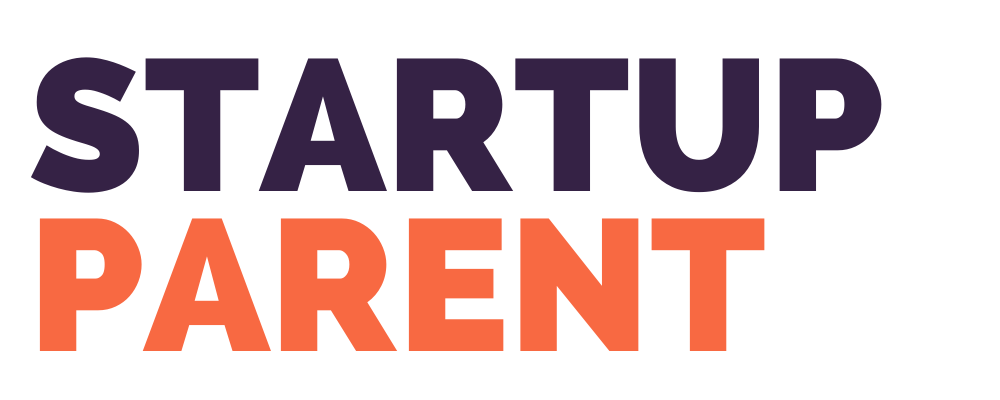Health and Wellness Advice Is Failing You. Here’s Why. — Episode Number 217 with Ali Shapiro
When Ali Shapiro battled cancer as a teenager, she received chemotherapy and radiation treatments. While Western medicine was able to save her life, it destroyed her health in the process.
After getting a cancer-free diagnosis, Ali committed to understanding how to truly improve health and wellness so that she could do more living. To make that happen, she had to step outside of the mainstream paradigms that influence our health choices. “I had to learn how to listen to myself,” she said.
Ali Shapiro is a holistic nutritionist, an integrated health coach, and a cancer survivor. She is the host of the Insatiable podcast and the founder of Truce With Food. “I am academically, practically, and empathetically aware of how the medical system, diet culture and body positivity movements all have their own flavor of crazy,” she writes. “I never found an approach that explained which foods would keep me healthy, and why I wasn’t eating them despite my good intentions.”
Over the decades since her cancer diagnosis, Ali returned to school to study nutrition, adult development, and how people make change in their lives. “From my academic research, which I applied and tested over a decade of working with clients and groups, I’ve learned that what we traditionally thought of as eating issues actually have very little to do with food.”
Too much mainstream “health and wellness” advice is focused primarily on weight loss as a goal—and uses damaging tactics like control, discipline, and restriction.
In her wellness journey, Ali noticed that most “health programs” focus primarily on weight loss as the goal. “Most of us grew up where health information is all funneled through weight loss,” Ali told Sarah in this episode. It completely erases the complexity and breadth of what health and wellness actually is. A more interesting question to ask, Ali says, is “would you do all of these things even if you knew it wouldn’t lead to weight loss?”
In this episode, Ali unpacks some of the damaging myths around mainstream “health and wellness” recommendations, and why they often don’t work for people. Mainstream recommendations are often centered on principles like control, discipline, restriction, and judgment instead of intuition, self-trust, choice, and compassion. Ali noticed how often these programs were unsuccessful, and so she knew there had to be another way.
Tune into Episode #217 with Ali Shapiro to hear more about:
- The lies and myths of modern “health and wellness” thought leaders.
- Why it’s nearly impossible to do parenting, work, and health by yourself.
- Why self-compassion and psychological flexibility are critical for personal growth.
- The four tenets of adult change and why adults learn differently than children do.
- Plus, Ali shares her own unique parenting journey, including early onset perimenopause and motherhood.
“Adults learn differently. But too many programs fail you because they don’t address how behavior change actually works.”
— Ali Shapiro
Adults learn differently. But too many programs fail you because they don’t address how behavior change actually works.
“Adults learn differently than kids do,” she explains on the podcast. That’s why so many programs will fail you. It’s not that you’re unmotivated, or that you lack discipline, or that you’re “bad.” The programs aren’t designed to actually work! So many so-called solutions will throw information at people (Like “Sugar is bad!”) but it doesn’t work because information doesn’t create change. (Also, sugar isn’t bad.)
If information worked to create change, then reading alone would create the change we hope for. But that doesn’t work. There are four tenets to adult learning, and an important process for how and why we change. Adults—especially parents—are busy, overwhelmed, and flooded with information, so we are much more discerning about what we will actually do. In order to make real change, you need to align with all four aspects of learning. That’s why Ali combined the four tenets of adult learning (from the book The Adult Learner) with the principles she learned in the book Immunity to Change to create a values-based approach to food and nutrition.
When you’re a grown-up, adults need specific framework for change to make lasting and effective decisions. If you’ve ever been in the position of knowing what you want to do (or ought to do) for your health and wellness, but you’re still not doing it, then this episode is for you.
Ali believes that by learning how to be in relationship with our bodies and trusting our inner wisdom, we can make choices that honor our true needs.
Too much of modern health and wellness is focused on chronic symptom management—that, or rescuing people from problems once the problem is discovered. But this isn’t a full picture of health, Ali Shapiro argues. Instead, there are ways to learn to be in better relationship with ourselves, our minds, and our bodies so we can truly be healthy.
Over time, through careful study of human behavior and examining the deeper values and emotions behind behavior, she transformed the relationship she has with her health. She healed chronic issues like adult acne, dealt with perimenopause, and she learned first hand how health is an ongoing practice that changes throughout life.
Then, she built a health business that helps others do the same—and it’s about so much more than avoiding illness or losing weight.
Ali built her company and practice around looking at the deeper emotional and psychological issues that can lead to health struggles, food fights, and more. “It’s not about willpower,” she writes. Instead, she teaches people how to get to the deeper root causes, helping them release old stories and rebuild new practices that align with their values and vision.
You’ll also hear about Ali’s parenting journey, her early-onset perimenopause, and the reason she’s only having one kid.
After successfully building her business, Ali turned her attention to growing a family. Because of her health history, she knew that she may come up against some hurdles in the process.
Ali sought out testing and learned that she was in perimenopause, which makes natural conception more difficult. Doctors recommended a donor egg and IVF for the highest likelihood of a successful pregnancy. Ali learned what she could from the Western medical model, and embraced a bigger picture of her fertility with insights from functional medicine and holistic health principles. In the end, she took a different path to motherhood. Listen to the episode to hear her story.
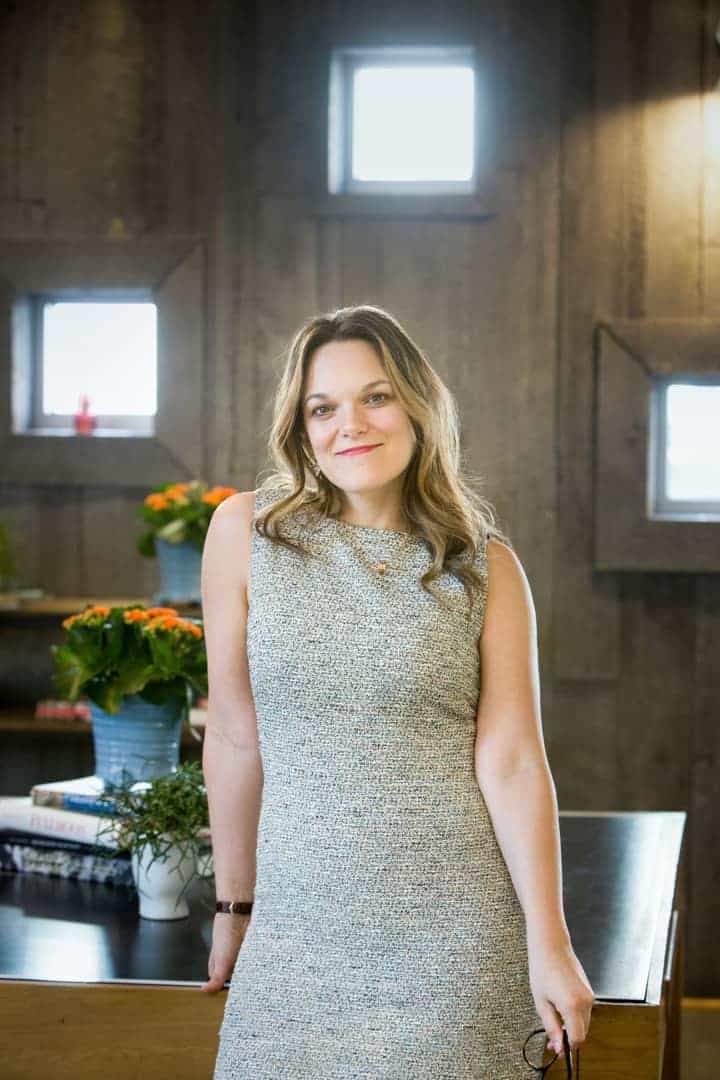
FEATURED GUEST
Ali Shapiro, MSOD, CHHC, and founder of Truce with Food®
Ali Shapiro is a holistic nutritionist and integrated health coach. Ali’s journey into wellness started with a childhood cancer diagnosis, where the treatment saved her life but destroyed her health. She spent the next twenty years finding her way back to wellness, resolving her struggles with depression, IBS, acne, and infertility along the way. She is the host of the Insatiable podcast and the founder of Truce With Food.
Over the decades since her cancer diagnosis, Ali returned to school to study nutrition, adult development, and how we can make change in our lives. Through her academic work and decade working with clients, she discovered that what is traditionally thought of as “eating issues” actually has very little to do with food. Today, Ali is on a mission to lead a healthy rebellion by helping people release the stories, patterns, and habits that are holding them back—and learn how to heal their relationship with food.
EPISODE SUMMARY
Sarah and Ali discuss:
- Ali’s journey to parenthood, including an infertility diagnosis, miscarriage, and becoming a parent during a pandemic. Because of Ali’s experience as a childhood cancer survivor, she wasn’t sure if it was possible for her to become pregnant. Then, when she began exploring the possibility of having children she found out that the odds of conceiving naturally were very low because she was in perimenopause. The doctors recommended a donor egg and IVF as the best options available, but Ali opted out of the Western medical model and took a different path to motherhood.
- The difficulty of balancing parenting, work, and health—and the role of the village in healthcare. If you’re struggling to manage your health on top of all your other responsibilities, you are not alone. Our current healthcare system was not built for the realities of modern living, and having children makes it even more difficult. Information isn’t communicated in a way makes sense for how adults learn, and we’re trying to do it all alone when we need a village. We cannot have healthcare without community care.
- How Ali’s experience with cancer led her to functional medicine and a new wellness paradigm. Ali came out of cancer treatment thinking that she was healthy because she no longer had the diagnosis, but it took her 13 more years to learn how to truly be healthy. At the age of 26, she discovered functional medicine. By connecting with the root causes of her symptoms (gut issues that were a result of chemotherapy) Ali was able to address her acne, irritable bowel syndrome, and depression—and later, overcome infertility. Chemotherapy saved Ali’s life but it also destroyed her health in other ways, and functional medicine helped her heal.
- The concept of psychological flexibility, and the value of being able to hold multiple points of view at once. Our Western beliefs and values around health are heavily influenced by the Puritans, and are rooted in a good/bad binary. This makes it difficult to practice “complexity fitness,” or as Ali puts it, the ability to “hold the ‘and.’” The hard experiences in life—like cancer, miscarriage, and infertility—are complex and require nuance to talk about. It’s essential that we have these conversations, which requires the ability to hold space for multiple feelings, like sadness and relief.
- The challenges of being healthy as an adult and how the four tenets of adult learning relate to health and wellness. The way that we learn as adults is different than the way we learn as children, and this disconnect is part of the reason so many people struggle with health. Adults are motivated to learn as they develop related interests, require experiences over information, need to be self-directing, and our learning is life or work centered. Ali explains how these tenets relate to managing our health, and shares examples of the framework in practice.
- The importance of self-awareness, self-compassion, and self-trust—and finding a health plan that works for you. So much of the mainstream wellness advice takes a one-size-fits-all approach, and assumes a degree of control or predictability in your schedule. However, children do not follow the structure that a calendar provides, which makes most recommendations useless for parents. Ali explains how to step outside of that noise, listen to your body, and put your learning into practice so you can heal.
“I was a feminist before becoming a parent, and, nothing will radicalize you more than motherhood and realizing this isolation and this individualism is all just bunk.”
— Ali Shapiro
CONVERSATION HIGHLIGHTS
Key ideas & supporting quotes from the conversation
So much of the parenting journey is learning how to embrace your individual experience.
“I started my business at the age of 29, so back in 2007. And I, it was a health business, and I just really was devoted to like figuring, creating my model and all of this kind of stuff. And so I just really didn’t understand how it’d be feasible to be a parent too.” (Ali Shapiro)
“I got pregnant in the summer of 2016. But then I miscarried like five days after I found out. And I think what I didn’t understand at the time – and I, and because I had cancer as a teenager, they never knew if it affected my fertility. So I actually had a really different reaction, I think, than a lot of people to miscarriage. It was kind of like, “Oh, my God, I can get pregnant,” like this was, this is really good data, you know, to be kind of, you know, about it. And I had only known that I was pregnant for like five days. So I didn’t have like all of the plans in place or anything like that. And so I, and I joke, like, I have enough of the patriarchy out of me that I didn’t think it was my fault.” (Ali Shapiro)
“I didn’t plan really well for like post pregnancy, like, once you have the baby. So it was a really rough entry here into parenthood. And I’ve discovered I’m not a baby person so, And I was menopausal! So that’s, that’s my my parenting journey in a nutshell.” (Ali Shapiro)
“And she’s like, I just don’t like baby, this baby phase. And she was like, You were the one who gave me permission; our sessions, gave me permission to like, admit that to myself.” (Ali Shapiro)
The healthcare and wellness industries aren’t built to support the complexity of parenting—or modern life.
“I felt like I really understood how to be healthy, but nothing prepared me- or I should say all of that stuff prepared me for managing the complexity of trying to be healthy, while parenting in a pandemic while going through menopause with very little to no childcare help, and trying to keep a business that your family depends on for half your- like half the expenses. And so I just totally understand when people are struggling with trying to manage these three big like pillars to any life. And so I just totally like empathize. If you tuned in to want to listen about health, like it’s hard when you’re doing all three.” (Ali Shapiro)
“It is so hard and yet it that’s the point. So much of health presumes that you have the ability to like get off the couch, the ability, the agency, the energy, the… What’s the word for when you have control over all of your time, like predictability, you said it assumes that you have these things and parenting, and parenting in a pandemic, and parenting in a pandemic as an entrepreneur, and parenting in a pandemic as an entrepreneur who is healing. Right? Those circumstances are so tremendously difficult that if I see something on Instagram, that’s like “the perfect morning routine is these five things and all you have to do is drink Soylent” it, I like, if I could reach through the phone and smack that person” (Sarah K Peck)
“I feel like the wellness world has be- a lot of it, well it’s become an industry. So it rails against Big Pharma, but it has recreated a lot of- it’s the same issues because it’s all rooted in capitalism, right? It’s, now we’re going to sell you supplements instead of drugs, or we’re going to tell you that we can fix this, you know, but that’s not always true.” (Ali Shapiro)
“How most of us get health information does not work… One in seven people who have a heart attack will actually make changes, right? These are people who actually almost died, and only one in seven will make the necessary health and lifestyle changes that we know would improve their outcomes. And so I share that because I think when you’re a parent, and you’re running a company, it’s can feel like health, again, is like the last thing on your list, right? And we can beat ourselves up from, for that, but a lot of the way that health information and health education is communicated is the problem” (Ali Shapiro)
“How does that show up in your life? Like, do you know that your cravings are because you’re not eating the right food for your body? Do you know that you’re waking up in the middle of the night because of your blood sugar issues? It’s like, oh, now I’m actually motivated to do this, because it’s gonna make my life easier, versus, we tend to think of like, what do I have to cut out? What do I have to change? I’m already tired, like you said, I can’t even get off the couch, and everything you’re describing to me takes more energy. So there’s a huge disconnect.” (Ali Shapiro)
Many of our ideas about health and wellness have been shaped by a cultural attachment to being thin, disciplined, and “good”.
“I didn’t understand how perimenopause change creates a lot of joint pain because you lose the protective benefits of estrogen and progesterone. So it’s like, I didn’t care about any of that until I couldn’t sleep. And I was like, yeah, why am I an insomniac? When you hear a lot of this stuff of perimenopause, or menopause, a lot of people you think you just have to live with those symptoms. And that’s what I’m talking about. I’m not saying you can reverse everything or whatever. But you can improve a lot of things. But that doesn’t fall into the weight loss conversation, or the like, gut cleansing conversations that we have now.” (Ali Shapiro)
“I think the big elephant in the room, because of how most of us have grown up, even if we don’t want to care about weight loss is we tie things back to, well, this, this exercise doesn’t count if I can’t do it consistently, because it’s not going to help with my weight. And I would encourage people to ask themselves, like, when you think about health stuff, if you knew it wouldn’t – the health stuff you’re currently doing – if you knew it wouldn’t lead to weight loss or weight weight maintenance, would you still be doing it?” (Ali Shapiro)
“it’s one of those huge invisible scripts, those like, the mindsets that we are bequeathed by our culture. The stuff that we’re swimming in is, for women especially, but now it’s getting really complicated with men too – about, you are valuable if you’re thin and small and tiny and invisible, and you don’t sweat. And then how much of weight, how much of health is disguised, but always pointing towards weight loss?” (Sarah K Peck)
“Even if you don’t think you’re religious, I mean, these ideas of good and bad, right? Fat and thin are code for good and bad, and, which is code for oh, you’re hardworking and disciplined — which the Puritans told us that means then you’re chosen by God.” (Ali Shapiro)
“Weight and health is just such a tender space. It’s a big tender space, it’s loaded, it has so many value judgments inside of that, and everyone’s experience is different. So I just want to give everyone the space to remember that you can disagree with me, you can find that what I’m saying about my own journey is very different than yours. I just want to keep that space open.” (Sarah K Peck)
“The chemo saved my life, but it also destroyed my health.”
— Ali Shapiro
Learning how to hold space for the “and” is essential for self-compassion, health, and growth.
“There’s this concept of psychological flexibility, and it’s the idea to hold multiple points of view, and multiple ideas — in fact, ideas that are in direct opposition with each other — in your mind at the same time. And it’s much more accurate to who we are to be able to, to say like, I am sad, and I am happy, right? I am happy that this pregnancy didn’t work out, and this is just an example, because I was scared of it. But I’m also sad that it didn’t work out because I wanted it. And that concept of psychological flexibility, being able to be with each little piece, is not modeled in a square Instagram post, or in a cliche quote.” (Sarah K Peck)
“My Master’s work is in adult development. And in developmental psychology, we call it complexity fitness. And it’s actually something that you have to learn to do. Basically that, the Instagram post says, “Can you hold the and?” You know, and it’s one thing to say that but then to really embody it is, is challenging, because we have these very binary ideas of what is good and bad.” (Ali Shapiro)
Connecting with your own motivations and experiences is essential for learning as an adult; we don’t need more information.
“my goal, actually, with my clients is not to tell them what to do, it’s to have them want to want to make the changes that they need to make.” (Ali Shapiro)
“I have loved thinking about the Gal Gadot, like Wonder Woman, like just being strong. That has been something, like that’s been a direction, a navigation point, like, I just want to be strong, and I want to be big, and I want to take up space. Like I want to be an Amazonian woman, I like want you to turn your head when you come in, because you’re like, ‘Oh, shit, she could take me out.’” (Sarah K Peck)
“I joke that I go to the gym to be able to be like, a middle-aged mom that can like, go down the slide with my son without like, pulling my back out. Like I am training to be the fun — I mean, again, like a physical mom. But that actually, that what you’re describing and stuff, I think is actually the second tenet of adult learning, which is yes, experience is the richest resource for adult learning. So, a lot of, we- basically, we need new experiences, not more information.” (Ali Shapiro)
“For me, postpartum and being menopausal, I started with a trainer on strength training, because I kept injuring myself every time I would pick my son up. And again, this was all perimenopause related, and I had plantar fasciitis, I couldn’t do much. But I, like have grown to love strength training. And it, now that I love it, I’m finding out all the information to confirm why I should love it, basically, is what’s happening. And you’re realizing like, oh, I don’t want to be small, like I this is the experience I want to have. But it’s based on like new experiences.” (Ali Shapiro)
“I have to take walks during the day to lower my cortisol, because my cortisol was so high from going nonstop, that that was what it was actually waking me up in the middle of the night. And I was like, yeah. So how many times have I heard get up and move your body every 90 minutes? How many times did I do that? None. But once I started realizing that it was causing my, one of the causes of my 2am to 4am wake ups, you bet your ash I was getting up.” (Ali Shapiro)
Knowing something isn’t the same as creating change, and “supposed to” is making us feel awful.
“But being smart and knowing something is not the same as change, and it’s not the same as implementation. And I think that’s part of the trap is like, I’m just gonna give you a lot of information. And then you’re like, I have a lot of information. And then you’re like, why is nothing changing?” (Sarah K Peck)
“These are important conversations to be having because every diagnosis has multiple factors that can help you improve it. But when it comes across, of this like moralizing way, which we’re already hearing in our head. And then it’s like, we’re seeking the confirmation, to tell us that we’re bad that we’re not doing this. It ends up in shame-based motivation, instead of, I really want to want to do this on my own because of my own terms and own reasons that I’ve come to.” (Ali Shapiro)
“I know what I need to do, and yet I can’t seem to do it. What’s wrong with me? Why is this so hard for me? Why am I so bad at this? That’s the place that I go sometimes, because I know that I’m supposed to eat more vegetables, I know that I could eat less sugar. And caveat for everyone listening, like health is up to you, and weight loss is a huge, huge arena of terrible messaging towards women. So I use this like, as just an example, I know that I’m supposed to do these things. And yet, I feel awful at the end of the day. And I’m completely exhausted. I’m totally overwhelmed. The children have probably punched me and hit me and screamed at me as they do at the age that they are, and and then I sit on the couch and I eat KitKat bars, because I’m done. I’m done, and I don’t make the change. And I have a lot of forgiveness for myself, by the way I don’t, I don’t actually go too much into the guilty space because I know somehow that I’m doing the best I can. Like I am. I’m doing the best I can with where I am” (Sarah K Peck)
The key to wellness lies in your ability to deconstruct the cultural paradigm you’re a part of, and access your inner wisdom.
“How do you want to show up at work? And she’s like, Well, I really value being innovative and being creative. And it’s like, okay, what support is going to help you with that process. And so now she’s really starting to start to value the process, and not just the outcome, which is that work-centered. It’s like, oh, food is the pain point. But it has nothing to do with food. In that case, I mean, it did in terms of like symbolically needing focus and energy. But it was how she was relating to success in her work that really was the need.” (Ali Shapiro)
“The question of like, why does this make sense? What it does for you, for me, I pause and I look at what is existing and I get to treat myself as wise from the get-go; to treat myself as smart. Like you were doing something, not as an idiot. You’re not being an idiot, you are doing something because it is it is, it is or it has taken care of you. It is or it has provided a benefit. And you are doing the smartest thing you know how to do right now.” (Sarah K Peck)
“And a lot of the values that we have, like discipline, for example, and discipline, responsibility, success, all of this stuff, especially in North American culture, these values are rooted in control. Right? So like discipline used to be about learning, it was came from disciple, how are you a learner? How do you learn how to learn? And now it’s about how do you control yourself? Right? Even when you’re tired? How do you override that? You know, responsibility, you know, for women, especially, responsibility is like how do you fix everybody else’s stuff? How do you control everybody? Right? But we never think about, what if I’m responsible to my own instincts and values, right? Like, so there’s, there’s a lot about value shifts, that when you start to orient yourself to “wise”, that you are wise and what you’re doing makes sense, you start to realize that basically, the templates that we’ve been given, for how to run a business, how to parent, how to be healthy, don’t even work in a moving system.” (Ali Shapiro)
“Where is your wisdom, you know, why is this wise? There’s so much self compassion, but it’s also the pause to feel because experiences are about feeling, right? And if you don’t give yourself the ability to feel something and feel into it, and really be in your body, which is a cliche phrase, but if you skip past all of that, I don’t think change ever happens.” (Sarah K Peck)
“The village is part of our health in a way that is primal. You can’t do anything to replace it. There’s no hacking around it, you need the village.”
— Ali Shapiro
QUOTES FROM THE EPISODE
Excerpts from the transcript of the conversation
Ali Shapiro: “My work is all about how are we relating to things; not what we have to do, but how we’re relating to it.”
Ali Shapiro: “There’s a structure because we know that structure can liberate.”
Ali Shapiro: “I do think we need to talk about miscarriage. We need to talk about how hard that is for people, and it’s also okay if it wasn’t super hard for you.”
Ali Shapiro: “My Western medicine credit card was already maxed out with the chemo and radiation that I’d been through. So I was really sure that I didn’t want to go down that path of the donor egg and IVF.”
Ali Shapiro: “When the choice has been taken away from you, it’s it feels different.”
Ali Shapiro: “Adults have a deep need to be self directing. If we did so well at being told what to do, whether in a course or with health, there would not be so many books on management, parenting, weight loss, or health.”
Ali Shapiro: “My one client was like, ‘This may sound so obvious, but I can’t believe how much more satisfied I feel with vegetables.’ And I said, ‘It’s not obvious. I mean, it may be obvious [in retrospect], but you had to come to that conclusion yourself.’”
Ali Shapiro: “Let’s not work to a finish line that we can’t ultimately control, or else we’ll end up missing out on what we can control.”
Sarah K Peck: “I don’t think that true change comes from self-flagellation. All the diatribes about discipline and the idea to just discipline yourself harder — that only works if you have this endless amount of willpower, and we don’t have endless amounts of willpower. Also, I don’t know if it’s lasting. Sure, you can learn to punish yourself, but also, that lifestyle might become miserable.”
Ali Shapiro: “For me, becoming a mother, I had to really look at this story of ‘I need to be exceptional to be successful.’ And whenever these stories flare up, when we feel like we’re unexceptional, or we’re failing, or we’re just we’re a disappointment, we turn to food because food is our first food is our first signal — touch and food — that we’re safe.”
Sarah K Peck: “When I start to notice where I’m cranky or mean, it’s often when people are saying unkind things about my work or my life. My behavior is often a lagging signal that my boundaries have been crossed. Now, when I go into a room where people offer unsolicited advice about my work or my writing, I know that I have more options than just reverting to the behavior I learned as a kid.
I have more options for protecting myself. I can say, ‘I’m gonna have to ask you to stop’ or ‘I’m not open to talking about my business with people right now.’ I can start to put in other invisible boundaries up, too, like getting out my drawing notebook or sketching quietly by myself. And every time they’re an a-hole, I’m gonna put another mark on my page. I’m gonna draw something on this page. I’m just gonna sit here and doodle. And then I have more options instead of the option I learned when I was four or six or eight where replying in kind was the only option I’d learned.”
“My husband and I went through this really big questioning period of asking, like, do we want to have a kid because society is telling us to? This is a kid. Is this really what we want to do?”
— Ali Shapiro
GRAPHICS
If it resonates, share this episode and feel free to share these graphics.
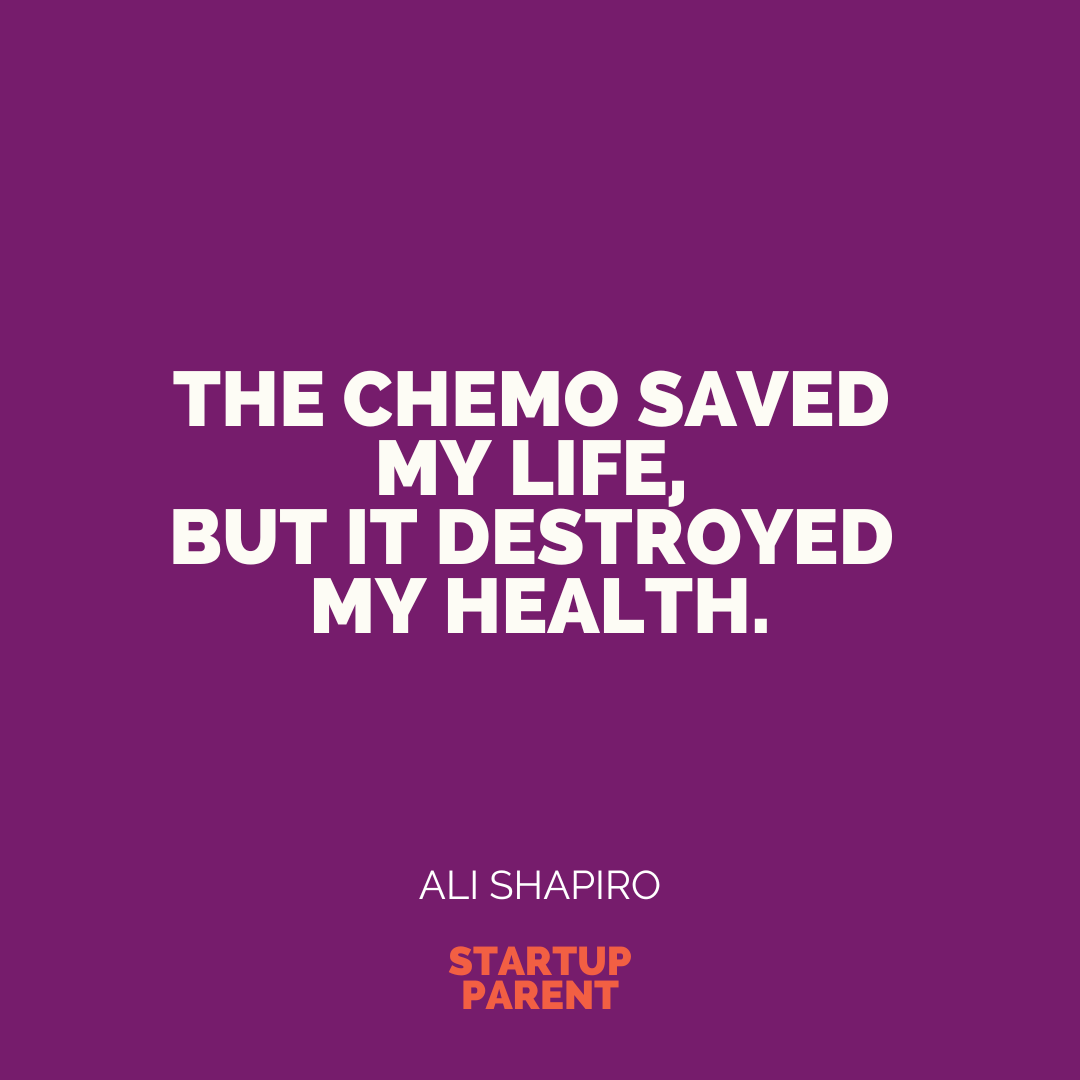
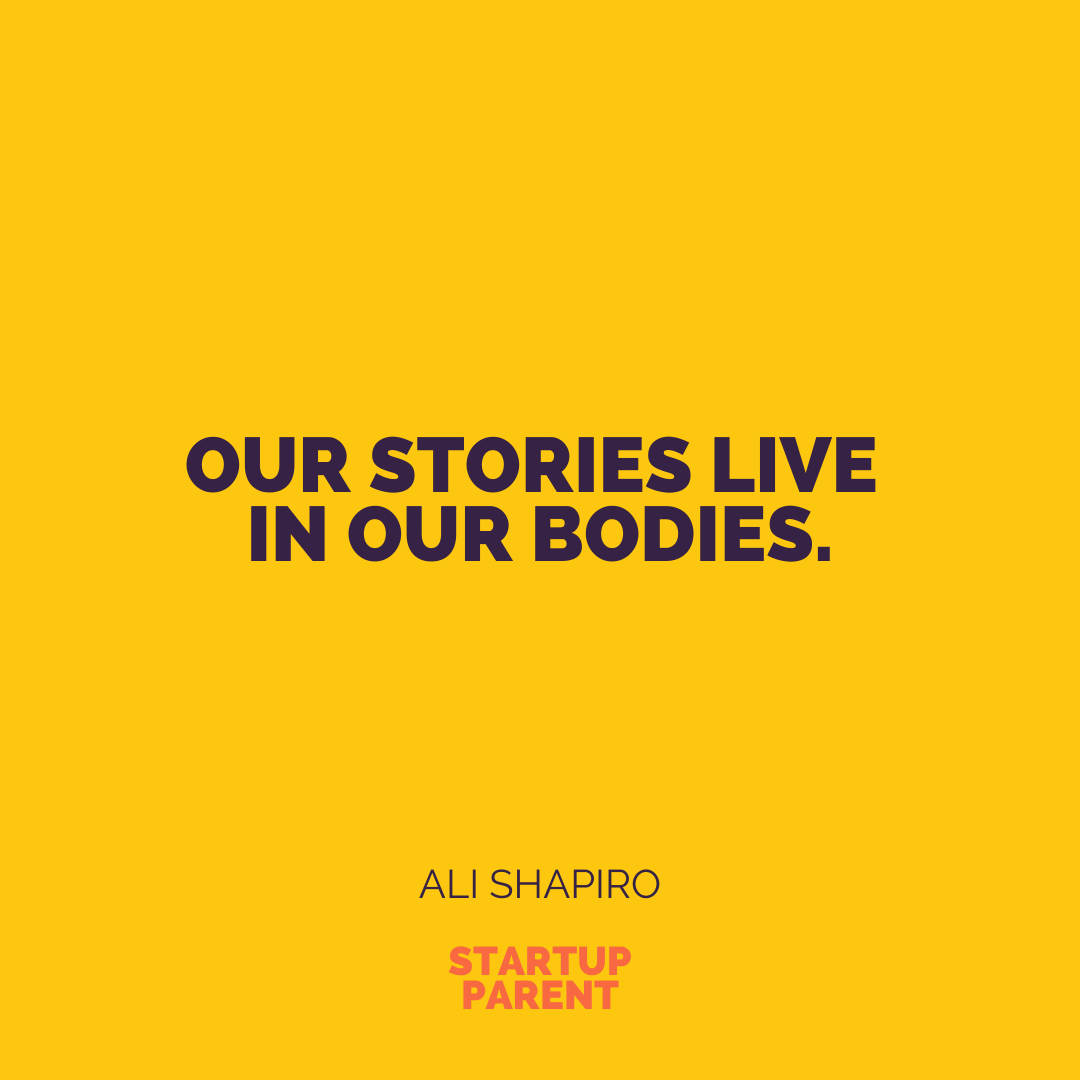
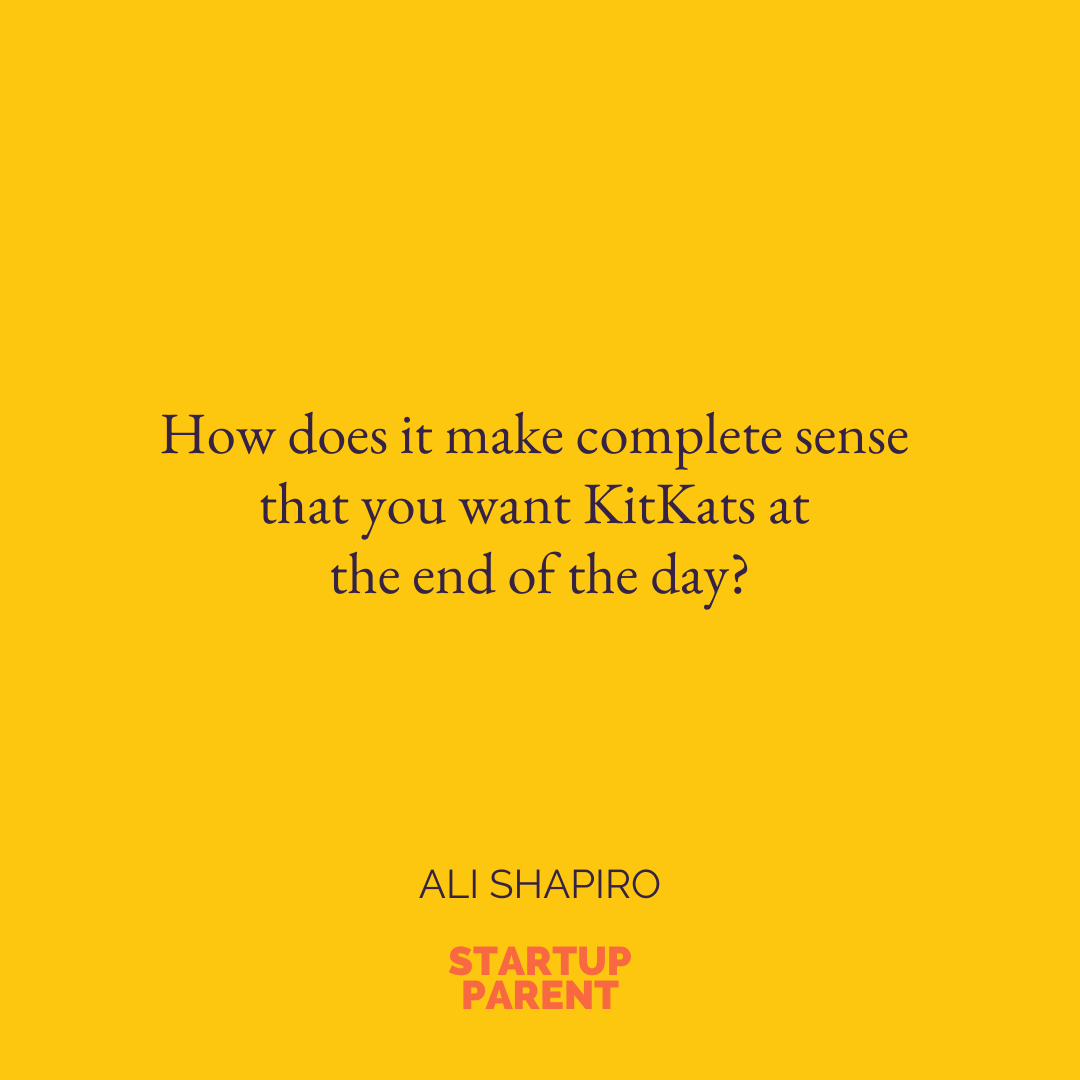
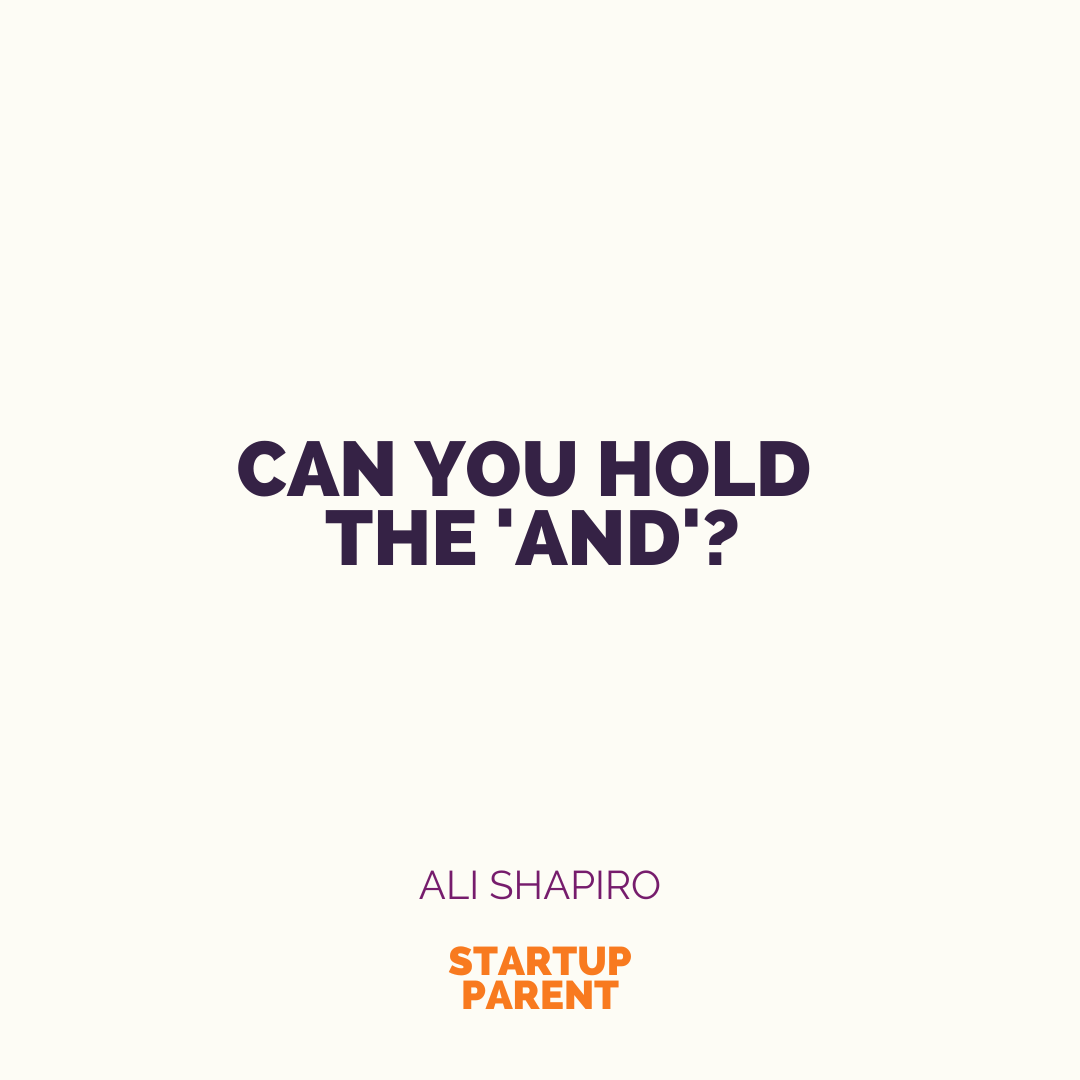
ABOUT THE STARTUP PARENT PODCAST
If you're growing a business, leading a team, or figuring out entrepreneurship and you have kids, this podcast is for you. We go in-depth with founders and entrepreneurial parents about what it really takes to have babies, grow businesses, and get a little bit of sleep. Sign up for the newsletter to get new episodes in your inbox. And leave us a review on iTunes.
Listen to The Startup Parent Podcast on Apple ★ Spotify ★ Google ★ Overcast ★ Stitcher ★ Castbox or wherever you listen to podcasts. Find another podcast player or the RSS feed here.
